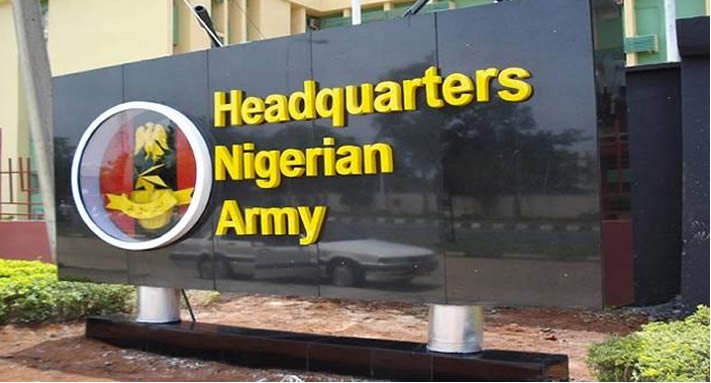
The theatre Commander of the North-East Operation Hadin Kai, Major General Christopher Musa, in this interview with DOGARA BITRUS, gives an update on the counter-insurgency operation in the region, the successes and challenges as well as how the insecurity in the country might affect the 2023 general election.
The Tukur Buratai Institute was attacked by Boko Haram/ISWAP insurgents. What is the extent of the damage caused by the insurgents?
I visited afterwards and discovered what happened was just propaganda. Insurgents are finding it difficult to dislodge any unit so what they do is find soft targets.
The school was on holiday. Only the Director-General and a few staff that were not more than five were around. They came in less than fifteen minutes, operated and left.
The only place they burnt was a place they set on fire that caught the plastic roof, that was all, they shot sporadically and when the troops advanced towards them, they took off and unfortunately for this same group, if you remember the Waka Biu attack some days later, they came back and we eliminated them all. It was the same group.
What were the insurgents ultimate aim for attacking the military training institute?
They wanted propaganda. They came with drones, shot at them, took pictures and ran away. It’s just the propaganda they are using. That’s what they want. You know the ISWAP is being funded by ISIS and they need to show that they are causing destruction before they can access the funds so they use propaganda and recycle old videos to prove to their financiers that they are active.
How can you describe the counter-insurgency war in the North-East by the military?
I can say we have a better understanding of counter insurgency operations. We renamed the operation as Hadin Kai because we need everybody on board. We have reached out to people we know are stakeholders in this region, the traditional rulers, market executives, transport workers, vigilantes, hunters, CJTF, all other paramilitary agencies are all on board and everything we are doing we have a better understanding even of the communities.
So generally, people have seen the sincerity of purpose of our actions and we have been very careful. We treat everybody humanely, preserve human rights and I think those things have really gone down well with the locals. I think those are the things that have changed their thinking.
Fighting equipment has been a challenge for the troops in the North-East. How have you been able to cope with that?
You know the present Chief of Army Staff, Gen Faruq Yahaya, I took over from him as the theatre Commander. While he was here, he understood the challenges here so when he became the COAS it made it a lot easier.
Early this year when we started Operation Desert Sanity, we moved into the Timbuktu triangle, Sambisa forest, Mandara Mountains, and other areas.
We are trying to dislodge them from all their camps, enclaves where hitherto they thought it was impossible for troops to enter, so we are making holistic operations to ensure that we clear out all those areas.
The insurgents seemed to have been degraded as their attacks have reduced in recent times. How have you been able to achieve that with the challenge of shortage in personnel executing the operations?
Immediately I took over, the Chief Of Army Staff gave us a directive that he wants us to conduct clearance operations that will degrade these guys completely and then we had several meetings.
We have three commands under Operation Hadin Kai – Maiduguri, Damaturu and Monguno. All the sector commanders are major generals who conduct independent operations simultaneously so it is not that they will get a place to run to because if they run to Timbuktu, they are being pursued from there.
The air force is pounding in the lake Chad region. The Maritime, and Navy are following up. Within the towns the policemen and DSS are following up. Everybody is playing its own role in the theatre.
Groups comprising o parents, wives and children of detainees relating to insurgency protested that their loved ones are still under detention albeit wrongly in Giwa barracks and other military detention facilities for years now but the military has refused to release them despite having no connection with the terrorists. Why is the military still holding these set of people while releasing the terrorists?
I don’t know who those groups are or what they are talking about, one thing I know is that there’s nobody that is being denied any access. I can tell you on a daily basis NGOs come in and see things as they are, how they live, feed and things like that are constantly being monitored and they go back to write their independent reports, if there was anything like that they would have written against us. And then when they say illegal arrest you see, these one that surrendered came out on their own. Now most of those guys that are at Giwa, it was during conflicts, during combats that arrests were made and brought in. Which means they have to be sorted out and because they don’t carry any mark to know this is Boko Haram and this not, which became an issue so we had to do that sorting and it’s painstaking.
Now one thing I want people to understand is, it is not the armed forces’ problem, all we do is just to secure them.
The Federal Government through the Attorney General office are the ones in charge of them. They are the ones to do the investigation, get the facts, anyone that has a case that will be prosecuted before that one and then he goes for trial. So ours is just to secure them until the judicial system takes place.
Anybody that has a case, facts are there to try them, the attorney general sends them to court for trial.
Was the military prepared for the sudden massive surrender of the Boko Haram insurgents?
We are not only prepared but we are doing it. These operations, ISWAP and Boko Haram are both surrendering.
What is the casualty level from the military side because it is a known fact that some soldiers have paid the supreme price in this counter-insurgency war?
It is a war we are fighting so there must be casualties but let me tell you even we are amazed because this is the first time we are doing a war that our casualty rate is less than one percent. Where we have casualties, mostly Improvised Explosive Devices IEDs and that remains our greatest threats and why is it so, because the roads are not tarred. So they come and implant IEDs when a vehicle goes over them, it blasts everybody in the vehicle. That is why our appeal is for the government to fix these roads. We have opened the Maiduguri Damboa road to Biu but because the road is not tarred, they always plant IEDs.
Between January and February, we have removed over a hundred IEDs on that road. Asymmetric warfare, people you are fighting are not wearing uniform, they blend easily like every other person. That kind of fight is difficult and we cannot go and carpet bomb everywhere because it will come against us so we have to be selective, so sometimes if we are not sure it is better we let them go than to kill innocent civilians but if it is normal conventional war everybody goes, so those are the issues that make the war very difficult.
Does the North-East operations synergise with other operations in other areas considering the patterns of operations of the terrorists in the North West and Central?
One division is in charge of the North West, Guards Brigades is in charge of North Central. There is another command that is in charge of Lokoja and the general areas.
So, we have commands that are in charge. In fact 8 div. is in charge of North West directly.
The terrorists take advantage of the forests to do most of these things. Unfortunately, we allow our forests to be empty. No country in the world allows its forests to be empty without forest guards. Right from the beginning, they would have prevented it because it is better than cure but we took things for granted and now it has afforded them cover that is why we intensify our own operations here maybe by the time we degrade them more, we can now be able to support other areas.
You also said some of the terrorists have migrated to other areas like Taraba State and some parts of the North-West. The Kaduna State government raised alarm that the terrorists have embarked on massive recruitment. Is there any similarity with their operations in the North-East?
The ones that ran away have filtered out to north-central and north-west. They have gone to join bandits.
Those ones in Kaduna have changed their names to Ansarudeen and they are massively recruiting in Birnin Gwari and Igabi LGAs in Kaduna. That is why we said the non kinetic system is what caused these things, it has to be governmental. Why are they recruiting – poverty, unemployment, illiteracy?
These are not things for the military. So you see, good governance is the thing that we need and then good policies. Those are remedies that we have to put in place.
With the heightened state of insecurity in the country, do you think the 2023 general elections can hold?
Depending on how it is handled, I don’t see these insecurities causing any challenge to the 2023 general elections. If it is handled the way the military is going about it holistically I don’t think it will create any issue except if the politicians cash on it. The politicians take advantage of every situation, some of them when they feel they are going to lose, then everybody should lose, that is the point. They can go and give them more money and empower them to do more destruction but I don’t see anybody disrupting the 2023 elections.
Let us talk about the welfare of soldiers. There were complaints of poor welfare packages for the fighting troops. What is the situation now?
The welfare of soldiers was a challenge before but not anymore. You see what we try to do, with the Chief of Army Staff we have, we don’t have any fear, you can talk to any soldier. Any soldier that has any issue is attended to, you get your salary, you get your allowances, you are fed well, you are given your kits, yours is just to do your own job. There might be issues once in a while, you know bank transactions. We don’t lose sleep over it but there is nothing deliberate about it.
When you hear soldiers complaining they don’t get allowances or something, most of them went AWOL. So there is a procedure, when you run, you leave your duty post, there is a procedure, after three days they report, after seven days you are declared AWOL, a letter is sent to army headquarters.
Copyright PUNCH.
All rights reserved. This material, and other digital content on this website, may not be reproduced, published, broadcast, rewritten or redistributed in whole or in part without prior express written permission from PUNCH.
Contact: [email protected]





